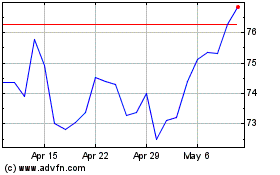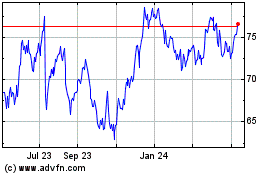Redefining What It Means to “Retire”: State Street Global Advisors Finds Half of the Workforce with DC Plans Will Continu...
June 26 2014 - 9:00AM
Business Wire
Employers Have an Opportunity to Help Employees Better Prepare
for their Financial Futures
The most recent retirement survey from State Street Global
Advisors, the asset management business of State Street Corporation
(NYSE: STT), indicates that 50 percent of retirement plan
participants no longer see retirement as a reason to leave the
workforce. Many expect a much more gradual shift from full-time
work to at least part-time work in retirement. This presents a
challenge to employers who need to make adjustments to how they
manage talent to accommodate a mature workforce. It also shows that
employers could improve benefits, such as savings boot camps and
other financial literacy programs to address employees’ overall
financial wellness, based on this new definition of retirement.
“There has been a major shift in the past 10 to 15 years and
retirement plan participants are expecting to continue to earn in
their retirement years,” said Fredrik Axsater, global head of
defined contribution at SSgA. “The desire to continue working is
not restricted by gender, age, savings, current income or
education. This signals a big change in attitude toward retirement,
and is indicative of the survey results showing that 40 percent of
participants anticipate working well past retirement age because
they want to work, not because they have to work.”
Survey highlights include:
- Nearly three quarters (74%) of the
respondents indicate that they were satisfied with the career
choices they made before retirement. However, having their dream
career in retirement is still envisioned by about 10 percent of
participants.
- The majority (65%) of DC participants
picture themselves maintaining their current lifestyle in
retirement.
- Sixty-four percent of survey
respondents between 50 and 75 years recommend investing earlier to
their younger selves, another indication that those in middle-age
are more apprehensive about retirement.
“Plan sponsors are in an advantageous position to influence the
way employees are saving and spending,” said Axsater.
“Conversations about lifestyle and influencing habits at an earlier
point in an individual’s career can have a major impact on
retirement preparedness.”
Plan Sponsor Improving Employees’ Retirement Planning
IQ
There are many factors outside of the control of these survey
respondents that can’t be anticipated. Today, less than 19 percent
of those 65 years and older are still working1. Whether it’s poor
health or overall difficulty maintaining employment because of
out-of-date professional skills, there are a number of challenges.
Twenty-seven percent of those surveyed, who were already retired,
felt they had been forced into it.
SSgA’s most recent data shows that the conversations plan
sponsors have with participants are imperative. Historical data
also supports that retirement confidence rises when more
conversations are had with family members, online or with an
employer2. This dialogue will become more challenging and complex
as the composition of the workforce changes and the meaning of
retirement becomes more individualized. However, plan sponsors can
help participants best achieve retirement readiness by increasing
the number and the relevance of conversations about current needs
and what a realistic future is for plan participants throughout
their employment.
Plan sponsors should keep three main points in mind as they
consider retirement interventions with their employees:
- Focus special attention on younger
employees. Their long time horizons give them more opportunity
to potentially benefit from a greater understanding of their
savings options. Nearly 80 percent of DC investors surveyed would
advise their younger selves to save more for retirement.
- Introduce or expand automated
features. In January 2013, a previous survey from SSgA found
that participants do not want to be left to their own devices when
it comes to saving for retirement3, and that they value help from
plan sponsors, specifically as it relates to auto-enrollment and
auto-escalation.
- Help build participants’ overall
financial wellness and aim to expand the conversation beyond a sole
focus on retirement readiness. Participants will be better
prepared for retirement if they are equipped to balance current
needs and future goals throughout their careers. This becomes
increasingly important as 49 percent of participants in SSgA’s
January 2014 survey were looking to shift to more conservative
investments4 and only about one third of the DC investors in the
most recent survey use a financial advisor. Plan sponsors can
engage participants throughout their employment with targeted
communications that will help them meet obligations and be ready to
retire when and how they see fit.
For more information on the survey or to subscribe to “The
Participant” magazine, please click here.
About State Street Global Advisors
State Street Global Advisors (SSgA) is a global leader in asset
management. The firm is relied on by sophisticated investors
worldwide for its disciplined investment process, powerful global
investment platform and access to every major asset class,
capitalization range and style. SSgA is the asset management
business of State Street Corporation, one of the world’s leading
providers of financial services to institutional investors.
Primary research
This survey was fielded in partnership with TRC Market Research,
an independent marketing research firm located in suburban
Philadelphia. To protect respondents’ anonymity, TRC was
responsible for survey administration and data analysis. SSgA
received the aggregate data for analysis purposes only. The data
were collected in April 2014 through a 10-minute Internet survey
using a panel of 980 verified 401(k), 403(b), 457 and
profit-sharing plan participants and retirees, aged 30 and
older.
1Current Population Survey 2013, U.S. Bureau of Labor
Statistics.
2SSgA DC Investor Survey, January 2013
3SSgA DC Investor Survey, January 2013
4SSgA DC Investor Survey, January 2014
The views expressed in this material are the views of State
Street Global Advisors through the period ended 06/26/2014 and are
subject to change based on market and other conditions. This
document contains certain statements that may be deemed
forward-looking statements. Please note that any such statements
are not guarantees of any future performance and actual results or
developments may differ materially from those projected.
The information provided does not constitute investment advice
and it should not be relied on as such. It should not be considered
a solicitation to buy or an offer to sell a security. It does not
take into account any investor's particular investment objectives,
strategies, tax status or investment horizon. You should consult
your tax and financial advisor. All material has been obtained from
sources believed to be reliable. There is no representation or
warranty as to the accuracy of the information and State Street
shall have no liability for decisions based on such
information.
Investing involves risk including the risk of loss of
principal.
CORP-1046
State Street CorporationElizabeth Bartlett,
+1-617-662-2903www.statestreet.com@StateStreet
State Street (NYSE:STT)
Historical Stock Chart
From Jun 2024 to Jul 2024

State Street (NYSE:STT)
Historical Stock Chart
From Jul 2023 to Jul 2024
